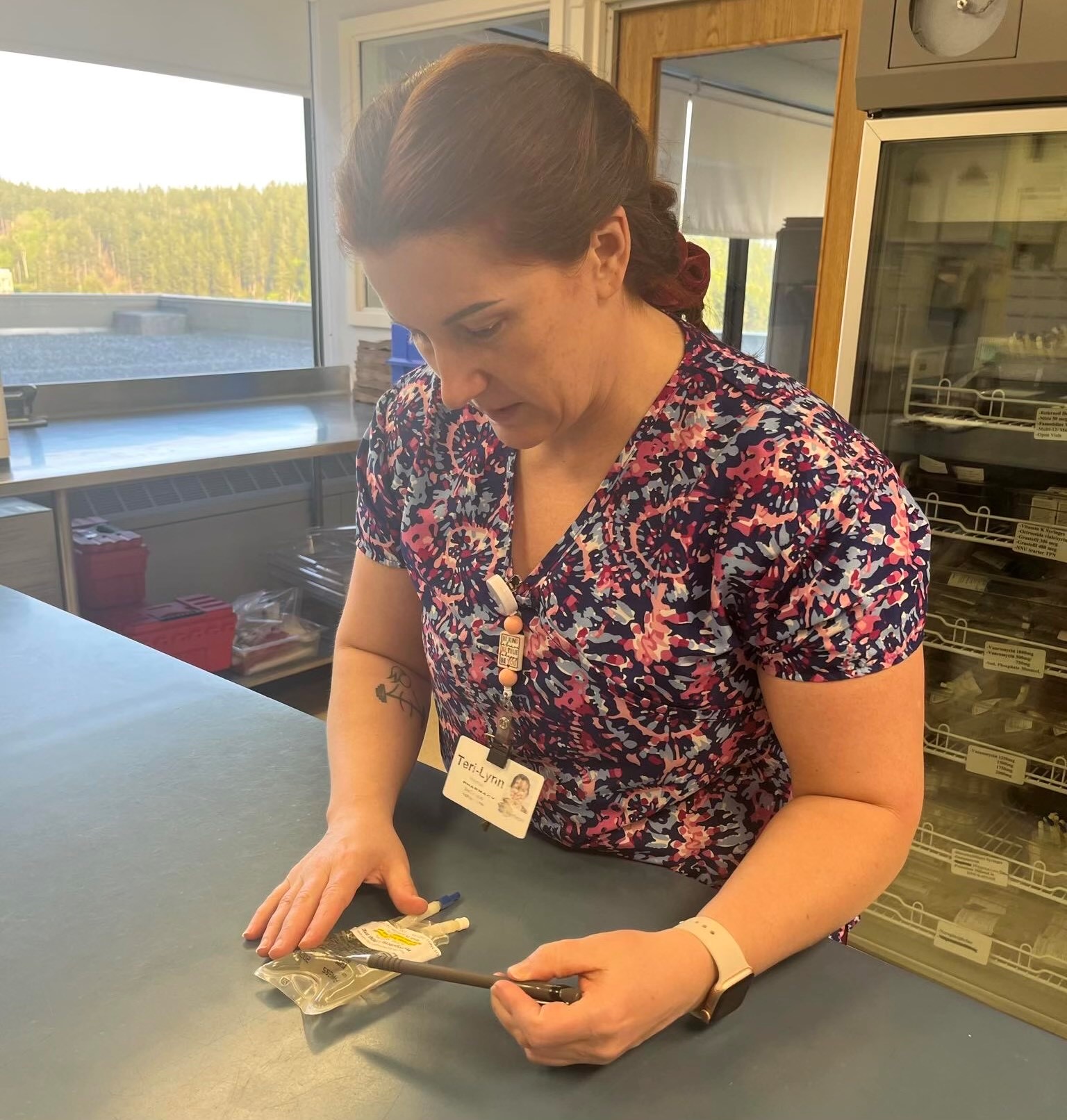
Q: I went to pick up my prescription last night and was told it would be a few minutes, the pharmacy technician just needed to do the final check. I thought only pharmacists could check prescriptions. What do pharmacy technicians do?
In 2015, the New Brunswick College of Pharmacists introduced the role of Registered Pharmacy Technician into practice in both community and hospital pharmacy settings. A pharmacy technician works under the direct supervision of the pharmacist and can perform many of the technical duties that were previously only done by the pharmacist. They can perform final prescription checks where they ensure the medication being provided is in the proper quantity with the proper label and packaging before bagging up your prescription. The clinical aspect of your prescription check has already been performed by the pharmacist who has verified the medication is appropriate for you in terms of the drug, the dose, the directions, your allergies, your medical conditions and your other medications.
By having pharmacy technicians focus on the technical aspects of pharmacy practice, pharmacists can allot more time to their expanding clinical roles. Pharmacists in New Brunswick can assess and prescribe medication for a variety of minor ailments including uncomplicated urinary tract infections, conjunctivitis, impetigo, cold sores, acne and eczema. Certain pharmacies have pharmacists offering other expanded services such as operating travel clinics and performing A1C and cholesterol testing.
Currently, there are six pharmacies in the province that are offering a Pharmacist Care Clinic Pilot program. Pharmacists at these appointment-based clinics are providing testing and prescribing for strep throat infections and chronic disease management for diabetes, COPD, asthma and cardiovascular disease. The goal in the future is to see pharmacist-led clinics expand to more locations.
Now to shift the focus back to the role of the pharmacy technician, I introduce Teri-Lynn Kingston who is a technician practicing in both community and hospital pharmacy. She will tackle the remainder of the article by discussing a few of her other job responsibilities:

Currently in New Brunswick there are 266 licensed pharmacy technicians working collaboratively with pharmacists and pharmacy assistants to help achieve optimal patient care.
A technician’s role in preparing prescriptions includes the data verification process where we ensure all the information on your prescription has been accurately entered onto your file in the computer system. This includes verifying your personal information, the drug, the dose, the directions, the quantity, the refills and your prescriber’s information.
The pharmacist then performs the clinical verification as described above, the assistant fills the prescription, the technician can step in again to perform the final check, and then the pharmacist provides counselling.
Technicians are also able to transcribe verbal orders for non-narcotic based prescriptions that are called into the pharmacy by prescribers.
We help directly with patient care by providing training and troubleshooting for medical devices such as glucose monitors, blood pressure monitors and aero-chamber attachments for inhalers.
All questions regarding your medications and medical conditions are still handled by the pharmacist. For example, we can teach you the proper use of a blood pressure machine in regard to cuff placement and obtaining an accurate measurement but would require the pharmacist to interpret the clinical aspect of your reading.
Pharmacy technicians are also trained in the sterile preparation of injectable products and to administer intramuscular injections. The training we receive is the same training as all the licensed pharmacists in New Brunswick and we are required to have our own liability insurance, the same as pharmacists. Most vaccinations administered in our province are given by pharmacists and pharmacy technicians working in community pharmacy settings.
In a hospital pharmacy, technicians are responsible for collecting your best possible medication history for your chart by asking you questions about your medications, reviewing the labels on your prescriptions and contacting your pharmacy for records. We also prepare IV bags for people requiring total parenteral nutrition, chemotherapy agents, intravenous admixtures and other compounded intravenous products that require specialized technique.
If this sounds like an ideal career choice for you, a two-year Regulated Pharmacy Technician course is offered at the NBCC’s Saint John and Moncton campuses, and at CCNB in Campbellton. Upon successful completion of the program, graduates are required to pass a National Licensing Exam and a practical work experience before they may begin work as a technician. For people already working as pharmacy assistants, Eastern College has recently begun offering a 48-week part-time Bridging Program to help you become a pharmacy technician.
Erin Thompson (BSc, BScPharm) is a graduate of Dalhousie University and a community pharmacist practicing at Shoppers Drug Mart in Quispamsis N.B. Her opinions expressed in this column are published for educational and informational purposes only, and are not intended as a diagnosis, treatment or as a substitute for professional medical advice, diagnosis or treatment. Registered Pharmacy Technician Teri-Lynn Kingston contributed.